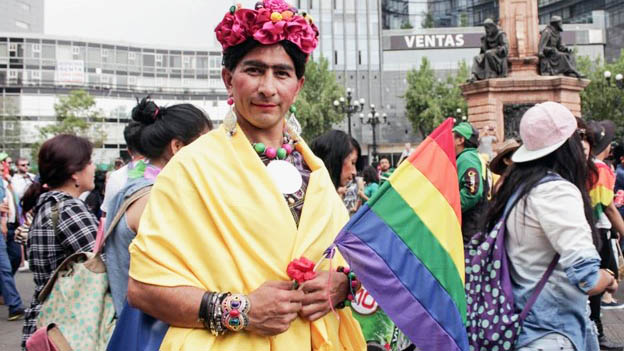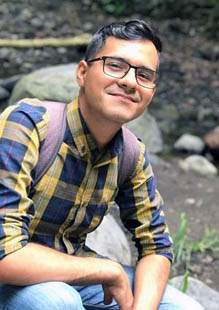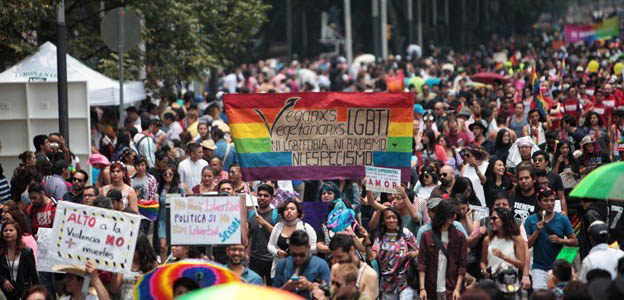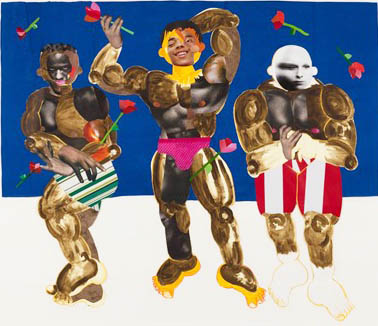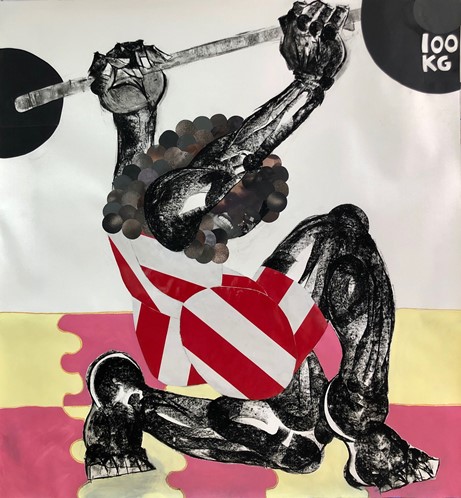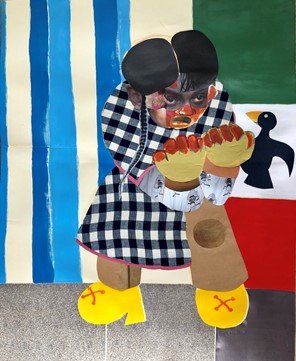|
|
|
|
The weekly newsletter of the México Solidarity Project |
|
|
|
August 25, 2021/ This week's issue/ Meizhu Lui, for the editorial team |
|
|
The Beautiful Light of the Gender Spectrum |
|
What if life brought us only bright daylight and total darkness? That would be an incredibly boring world, without the magnificent colors, the pinks and purples, that grace our dawns and sunsets.
European culture has historically stuck us in either/or thinking. Our only choices: x and y. Any “g” — let alone any “t” — must be shunned and shamed, banned and eliminated. In medieval times, the powers-that-be used gays as “faggots,” tinder for starting the fires that burned other transgressors at the stake. Today, in the US and México, many around us still see those who do not present as clearly male or female as willful deviants, flawed souls who need medical interventions to make them “normal” — or dangers to society who need to be locked away or even shot for the crime of nonconformity.
Feminists, in challenging the role of women in society, have opened the door to new questions about the meaning of gender. If women don’t need to stay in their place, if they can hunt and not just gather, why shouldn’t LGBTQ people also not challenge their assigned “throw-away” role?
In México today, thank goodness, the dawn has finally broken. In our interview this week, Irving Radillo Murguía describes the gradual lightening of the Mexican sky. Beautiful and diverse colors no longer remain just forever on the horizon. They are spreading across the country. May we all accept this new spectrum, this wonderful gift, with gratitude.
We’re dedicating this issue to our fellow México Solidarity Project activist Badili Jones, a gay, bilingual, African American builder of bridges between Black and Latinx peoples. He died unexpectedly this past June. |
|
|
Irving Radillo Murguía teaches social sciences in Colima, Mexico. He’s currently channeling his activism through the LGBT+ group Orgullo Disidente — Dissident Pride — and the socialist organisation Coordinadora Socialista Revolucionaria.
When did the gay liberation movement begin in México?
The first open demonstration came in 1978 during a celebration of the 20th anniversary of the Cuban revolution. The same year, another demonstration commemorated the Tlatelolco massacre in 1968, where the government gunned down hundreds of protesting students. |
|
|
From these beginnings, you can tell that the original Gay Liberation Movement in México was rooted in left politics, organized by communists and anarchists. Repression followed. And resistance! Another demonstration the next year celebrated the 10th anniversary of the Stonewall rebellion, the event that kicked off the gay liberation movement in the US.
What’s life like for gender non-conforming people in Mexican families and schools, in jobs and society overall?
That depends on what part of México you live in. México City rates as the most comfortable place to be, with marriage equality and a conversion therapy ban. The states of México and Baja California also have laws banning these so-called “cures.” More and more states are legalizing same-sex marriage and the right to identify your own gender rather than forever being identified as the gender listed on your birth certificate.
We’re also seeing cultural change on TV and on popular telenovelas. This programming is including LGBTQ characters and not negatively stereotyping them. Attitudes are changing. According to a 2019 poll, 70 percent of parents would be accepting if their child were gay or lesbian, and 60 percent would accept a trans child.
But we have a long way to go. Around 90 percent of LGBTQ kids experience bullying in school, and homophobia spawns violent attacks. Health care that understands the special needs of our community, including access to hormone treatment for trans people and to appropriate mental health services remains practically non-existent. Only México City has a clinic specializing in our health needs.
Are trans people raising their voices as they are in the US?
Trans people, particularly trans women, have started to organize and to make their own specific demands. Job discrimination has forced many trans women into the sex industry, often run by drug cartels, where they face everything from rape and violence to criminalization and incarceration. Of the LGBTQ people in prison in México City, 30 percent are trans, even though trans people make up only a small percent of that population. |
|
|
Is the LGBTQ movement working together with the feminist movement, or do the two movements operate separately?
Feminists are better organized than the LGBTQ movement, and, unfortunately, they do not include LGBTQ demands in their agendas. Within the LGBTQ community itself, we’re engaging in self-criticism about our own sexism. We’re also gaining a better understanding of intersectionality, and the different ways different cultures of México see non-conforming gender. In Oaxaca, for example, people called “muxes,” not male or female, are treated with respect. Indigenous communities have always been more accepting of gender diversity than European cultures steeped in Catholicism and good/evil binaries.
What attitude is the Mexican government taking?
PRI President Pena-Nieto in 2016 proposed that gay marriage be legalized nationwide. Why? He had little popular support and was trying to win progressives to his side. Instead, his move triggered a right-wing backlash: A newly formed Frente Nacional por la Familia mobilized 400,000 people in 80 cities, enough to soundly defeat the legalization proposal. AMLO has been silent. Our rights are not his priority.
The movement had radical roots. Does it still stand for a transformed society or is it focused narrowly on LGBTQ issues?
Many LGBTQ people have gone mainstream, and they’re looking for acceptance in society as it exists. We call this trend mercado rosa, or “pink” capitalism!
What is the movement demanding now, and what do you think the future holds?
We demand marriage equality, an end to attempts to “convert” us, a crackdown on the rape and murder of gay youth by police, a prohibition on hate crimes, and moves to both protect LGBTQ people, especially trans women, and allow the legal re-designation of gender by individuals themselves.
We have not yet built effective organizations, but our movement has grown in size and vitality over the last 20 years. The growing intersection of the social movements strengthens our cause. What makes me the most optimistic: the activism of young people.
Are more folks asking people to use gender neutral pronouns?
Some are using a third pronoun elle, when él and ella don’t fit. Language has never been static. It changes as society changes. The story continues! |
|
|
|
Clotilde Jiménez: Lingerie, Boxing Gear, and So Much More |
|
Vickie Hamlin, our México Solidarity Project art editor, offers an appreciation of the work of one of México’s most innovative young artists.
The US-born Clotilde Jiménez, like many other non-Anglo artists, has found “home” away from home. He now lives in México City where his work, not “pretty” or “easy” in the tradition of European art, tackles subjects that might make some uncomfortable. Those subjects reflect Jiménez himself, his childhood, lived experiences, and complex identities. Black, bisexual, Puerto Rican, poor, athlete, dreamer — all these identities and more make Jiménez a living collage. He utilizes, as his bio puts it, “quotidian, relatable childhood experiences that present the question, ‘What is so queer about queerness?’”
Jiménez clearly has the chops to do traditional European-style drawings and paintings of beautiful male bodies, but he chooses an entirely different direction. He uses chunky swipes of paint and charcoal, big flat raw cut-outs of collage, lines over swatches of bright color to express the grit and power of big, strong bodies ready to duke it out. Did I mention vinyl over brass? The relationships between the men push and pull at the same time, in fierceness and intimacy, defeat and dominance, the whimsical and the serious. You won’t find other art that combines lingerie and boxing gear!
You will find, in Jiménez’ work, lots of stories, and he narrates with an unafraid, joyful voice. He pushes boundaries — by honestly showing his, my, our life with his art. |
|
|
|
Above left: The Contest, 2019, acrylic and mixed media collage. Right: Orange Boxer, 2020, bronze. |
|
Below left: Pose #11, 2020, charcoal, acrylic, and mixed media collage on paper. Right: Xóchitl Fights Back, 2019, acrylic and mixed media collage on paper. |
|
|
|
|
Recent news reports and commentaries, from progressive and mainstream media,
Robert Kuttner, A Big Win for Mexican Workers — and a Model for the U.S., American Prospect. The USMCA trade agreement now provides to Mexican workers far stronger rights to vote for the union of their choice, free from company harassment or retaliation, than their U.S. brothers and sisters have under current U.S. labor law.
Trabajadores echan a la dinosáurica CTM de la General Motors en Silao, Polemón. En mayo pasado, el gobierno estadounidense presentó una querella después que se sorprendiera a funcionarios del viejo sindicato presuntamente destruyendo boletas en una votación anterior, tal como lo han hecho durante décadas. La querella de mayo fue la primera presentada bajo el T-MEC.
Ann Deslandes, Mexico sues US gunmakers, but will it make a dent in trafficking? Aljazeera. A gun manufactured in the US now more likely to be used to murder a Mexican citizen than an American.
John Ackerman, El fin del neoliberalismo cultural, La Jornada. Durante la larga noche neoliberal, el saqueo, la corrupción, la violencia y los fraudes característicos del viejo régimen fueron “explicados” y “justificados” a la población como resultado de una serie de supuestas debilidades culturales del pueblo mexicano.
Jorge Gómez Naredo, El Tribunal Electoral que lucha contra la democracia, Polemón. Queda claro que el Tribunal Electoral tiene ya una agenda, y ésta está basada en un solo objetivo: afectar a Morena. Todas las decisiones que está tomando son en contra de este partido político.
Mexican NGOs join forces in call for overhaul of mining law, Bnamericas. Current mining law has benefited only a small business elite at the expense of human life, health, and rights. |
|
|
The Mexico Solidarity Project brings together activists from various socialist and left organizations and individuals committed to worker and global justice who see the 2018 election of Andrés Manuel López Obrador as president of México as a watershed moment. AMLO and his progressive Morena party aim to end generations of corruption, impoverishment, and subservience to US interests. Our Project supports not just Morena, but all Mexicans struggling for basic rights, and opposes US efforts to undermine organizing and México’s national sovereignty.
Editorial committee: Meizhu Lui, Bruce Hobson, Bill Gallegos, Sam Pizzigati. We welcome your suggestions and feedback. Interested in getting involved? Drop us an email! |
|
|
|
Web page and application support for the México Solidarity Project from NOVA Web Development, a democratically run, worker-owned and operated cooperative focused on developing free software tools for progressive organizations. |

